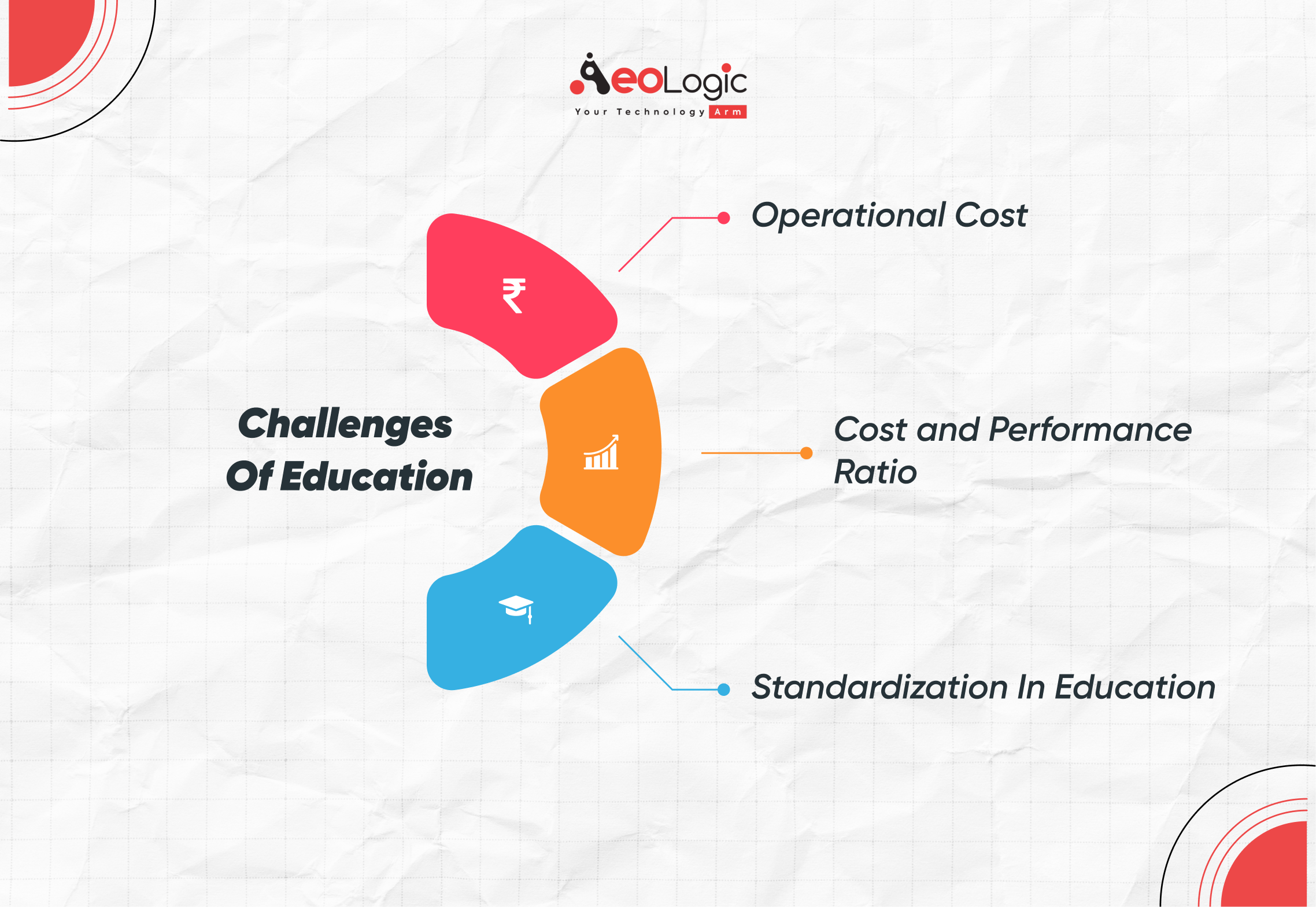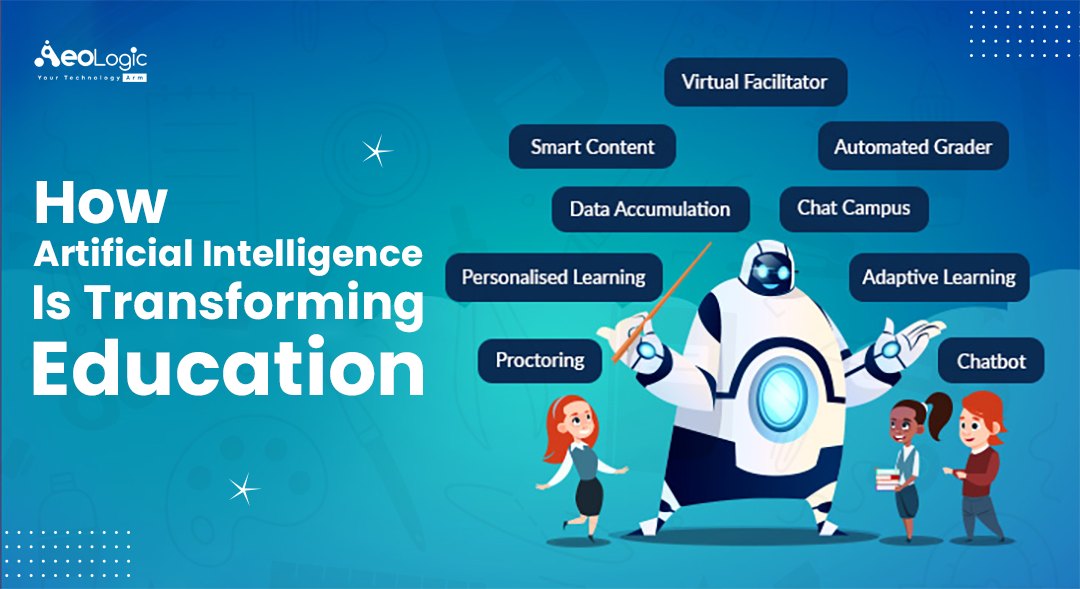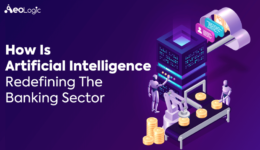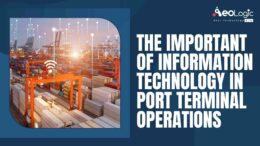“Artificial intelligence”, also commonly referred to as AI, is one of the most advanced technologies of recent years. This technology has come into the limelight because of its magnificent ascendance over various other technologies. AI enables businesses to function more efficiently, effectively, and productively. On the other hand, education is the core of every economy around the world. In the coming years, only those countries will excel which have a great number of scientists, philosophers, doctors, engineers, and the list goes on. This can be achieved by having a good education system.
That’s been said!
Welcome to this blog, where you’ll get to know about the correlation between the above-mentioned two different things, that is artificial intelligence (AI) and education. And how AI is transforming the education system.
But before we start, let us first dig into the obstacles/challenges the education system is facing.
Challenges Of Education

Over the past few years, the education system is experiencing some heavily major challenges that no one has ever imagined in the past. With the continuous evolution of technology and the challenges of a global pandemic of coronavirus, we all have witnessed the shift from offline classes to online classes. Still, this is just the tip of the iceberg. Below-mentioned are some major challenges faced by the education system.
1) – Operational Cost
To run a school, a good amount of resources is needed, and these resources cost money. Most schools find it challenging to bear all the costs. A lot of cost gets spent on maintaining administrative work. Most of these schools are either publicly funded or non-profit. Hence, cost controlling has become a very necessary part of school operations, and in order to maintain this many schools, management finds it a very challenging task.
2) – Cost and Performance Ratio
This is another challenge that the education industry is facing and that is despite the fact that there has been a considerable amount of increase in the cost of education still, the result for students has been the same. The academic scores of students have not shown much improvement. The reason behind this is standardization in education. Thus, a need for innovation in the education industry is required to boost and serve the wide range of student’s interests, learning styles, and aptitudes.
3) – Standardization In Education
Ever since the beginning, the education system is being standardized. This standardization has very devastating results on the future of students. Differences in age, gender, family background, and ethnicity do not get considered because of standardization. Moreover, all the students are different from each other and their learning styles and speed are also different, so a common way of educating them can never be effective. The standardization also fails to behold individual students’ talent and aptitude.
To overcome these challenges the implementation of technology had become the need of the hour and to automate the process the adaptation of artificial intelligence (AI) is getting done in the education industry.
The Transformation of Education With AI
The traditional way of teaching and former education is being evolved constantly. This evolution is making global teaching methods more structured and reformed, which resulted in giving streamlined outcomes. Not only this, even the relationship between students and teachers is also getting better and deeper as teachers have started understanding their student’s perspectives and interests.
The intervention of technology has played an important role in uplifting the relationship between teachers and students, and in this perspective artificial intelligence (AI) has a significant role. The following are transformations done by artificial intelligence (AI) in the education sector.
1) – Automating Administrative Work
One of the most prominent advantages that AI gives to the education industry is by automating their administrative work. This enables adequate time for the teachers to have a more profound focus on students. The implementation of artificial intelligence (AI) allows the school management to have effective classification and processing of paperwork. This happens because AI enables automation and hence, it leads to reducing the chances of human errors.
2) – Smart Content
The implementation of artificial intelligence (AI) in the education sector, has increased the quality of education and also made it more accessible for the larger population in the form of smart content. This is known as smart content because the advancement of technology enables the making of customizable content for different types of students from different regions to meet their different learning styles. This content can be shared in virtual format via the internet. AI enables teachers to teach their students from anywhere and anytime.
3) – Personalization In Education
Teachers find it difficult to concentrate on each of the students in a class full of 45-5- students, approx. Eventually, teachers fail to focus on every single student’s strengths and weaknesses. To overcome this challenge, the implementation of artificial intelligence (AI) is being done so that the teachers could be able to effectively to track the performance of each and every student. This will give phenomenal results in streamlining the career of students.
Conclusion
To sum up, the implementation of artificial intelligence (AI) is transforming the education system and making it more optimum. This evolution is beneficial for both the students and as well for the teachers. The above-mentioned challenges and benefits are just the tip of the iceberg, and there is a lot more to this transformation, to hold on to it.
We are living in the most advanced time when everything is technologically driven, and so will our education system in the near future. So implementing AI into education is the need of the hour.
Are you looking to implement artificial intelligence into education? If yes, so, please feel free to contact us at support@aeologic.com







